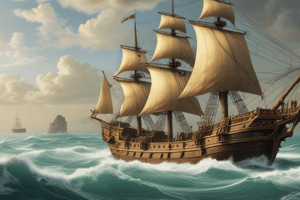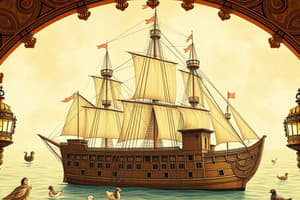Podcast
Questions and Answers
What was the main economic motivation for the Portuguese to establish a presence in India?
What was the main economic motivation for the Portuguese to establish a presence in India?
- To spread Christianity in the Indian subcontinent
- To introduce new forms of agriculture to India
- To establish military dominance over Asian countries
- To control key ports and ensure the quality of goods exported to Europe (correct)
How did the arrival of the Portuguese impact local communities in India?
How did the arrival of the Portuguese impact local communities in India?
- It led to the enslavement of many Indians and altered traditional farming methods (correct)
- It focused solely on spreading Christianity, neglecting economic aspects
- It had no effect on existing social structures in India
- It promoted cultural exchange without any negative consequences
Apart from economic motivations, what other benefit did the Portuguese bring to India?
Apart from economic motivations, what other benefit did the Portuguese bring to India?
- Introduction of new governance systems
- Influence on the development of the Bengali script through Christianity (correct)
- Enhancement of local agricultural techniques
- Promotion of Asian trade routes
How did the Portuguese desire for labor affect local communities in India?
How did the Portuguese desire for labor affect local communities in India?
What long-term impact did the Portuguese arrival in India have on global history?
What long-term impact did the Portuguese arrival in India have on global history?
Who is credited with leading the first direct voyage from Europe to India by sea?
Who is credited with leading the first direct voyage from Europe to India by sea?
What made Portugal one of several European powers exploring new worlds in the early fifteenth century?
What made Portugal one of several European powers exploring new worlds in the early fifteenth century?
Which European power established a foothold in India for access to valuable spices?
Which European power established a foothold in India for access to valuable spices?
What was the primary focus of the initial voyages by the Portuguese under Prince Henry the Navigator around 1419?
What was the primary focus of the initial voyages by the Portuguese under Prince Henry the Navigator around 1419?
Why was Vasco da Gama's expedition significant in 1497?
Why was Vasco da Gama's expedition significant in 1497?
Flashcards
Portuguese exploration goal
Portuguese exploration goal
Portugal sought wealth and trade opportunities in the early fifteenth century.
Prince Henry's role
Prince Henry's role
Prince Henry guided early Portuguese voyages, focusing on maritime discovery before exploitation.
Vasco da Gama's achievement
Vasco da Gama's achievement
He led the first direct voyage from Europe to India by sea in 1497, reaching Calicut, Kerala.
Economic strategy in India
Economic strategy in India
Signup and view all the flashcards
Impact on local societies
Impact on local societies
Signup and view all the flashcards
Long-term significance
Long-term significance
Signup and view all the flashcards
Study Notes
Portuguese Arrival in India
In the early fifteenth century, Portugal was one of several European powers exploring new worlds in search of wealth and trade opportunities. One such journey led them to India, where they established a foothold through which they could gain access to valuable spices that were highly sought after in Europe. This momentous event marked the start of what would become known as the era of Portuguese exploration and colonization in Asia, with India being among their first major interests.
Origins of the Journey
The initial voyages by the Portuguese began under Prince Henry the Navigator's guidance around 1419. These expeditions focused more on maritime discovery rather than immediate exploitation, setting the stage for later explorations into uncharted territories like India. Before these endeavors, there had been limited interaction between Indian merchants and Western travelers due to the lack of navigational know-how on both sides, making it difficult for either party to traverse vast distances across oceans.
Vasco da Gama's Voyage
One of the most significant figures during this period was Vasco da Gama, who is credited with leading the first direct voyage from Europe to India by sea. In 1497 he set sail with four ships and reached Calicut, Kerala, in May 1498. His expedition proved crucial because it demonstrated that it was indeed possible to navigate around Africa and reach India via water routes.
Economic Motivations
For the Portuguese, whose economy depended heavily on international trade, particularly with Asian countries, establishing a presence in India held great strategic importance. By controlling key ports, they could ensure the quality and quantity of goods exported back to Europe, as well as secure trading privileges for themselves within local markets. Additionally, India offered raw materials—such as textiles and foodstuffs—that complemented what Europe could produce at home.
Impact on Local Communities
However, despite bringing economic benefits to Europe, the arrival of the Portuguese also brought changes to the existing social structures in India. They introduced new forms of agriculture to grow crops suitable for European tastes, thus altering traditional farming methods. Moreover, their desire for labor led to the enslavement of many Indians. Despite these drawbacks, however, some positive aspects emerged too; for example, the spread of Christianity influenced the development of the Bengali script.
Conclusion
Thus, the Portuguese arrival in India signified a turning point in global history, opening up new possibilities for trade and cultural exchange across continents. It laid the groundwork for subsequent waves of colonialism, reshaping economies and societies worldwide over centuries to come.
Studying That Suits You
Use AI to generate personalized quizzes and flashcards to suit your learning preferences.



